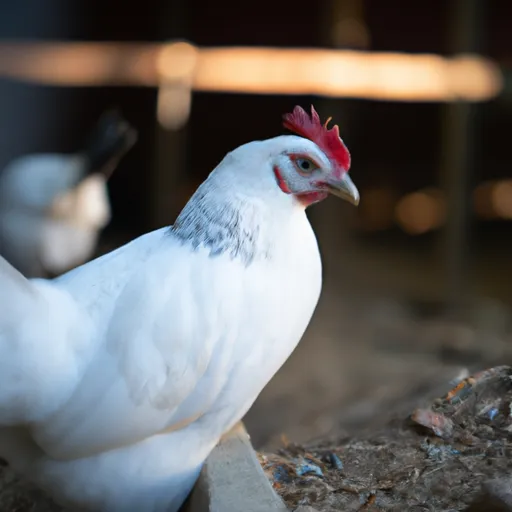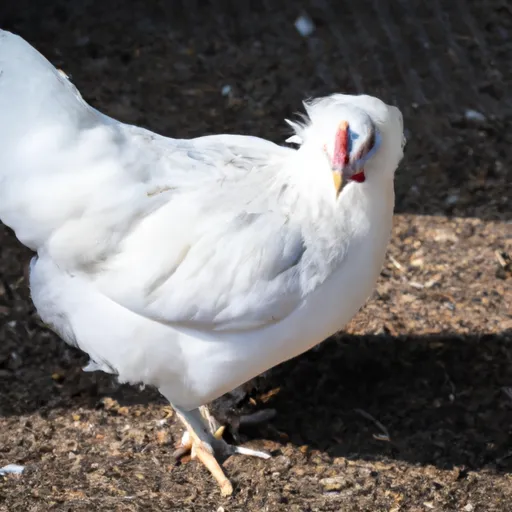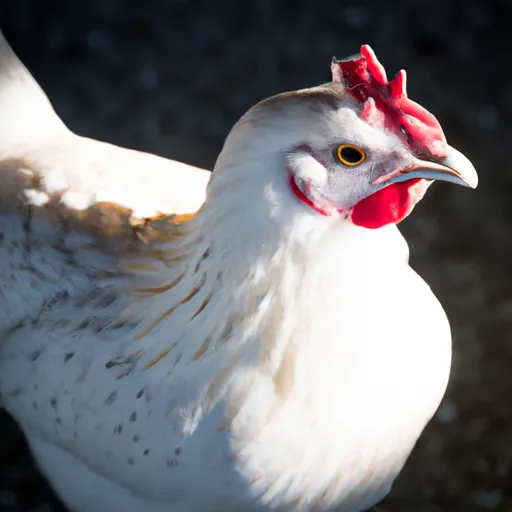What Color eggs do White Plymouth Rock Chickens lay?
Curious about what color eggs white Plymouth Rock chickens produce? Wonder no more!
In this article, we'll take a closer look at the egg-laying habits of these chickens and explore whether there are white Plymouth Rock chickens in the first place.
We'll also delve into the friendliness and temperament of this breed and find out just how many eggs they lay. So, let's discover the secrets behind the eggs of white Plymouth Rock chickens!

Introduction
If you're a chicken enthusiast or considering starting your own backyard flock, you've likely come across the White Plymouth Rock chicken.
These stunning birds are a popular choice for many poultry keepers due to their striking appearance, friendly temperament, and reliable egg-laying capabilities.
In this article, we will delve into the characteristics of White Plymouth Rock chickens, explore their egg production, discuss their brooding behaviors, and provide tips for managing their egg laying.
Additionally, we will touch upon other varieties of Plymouth Rock chickens and address some frequently asked questions to ensure you have a well-rounded understanding of these delightful birds.
Appearance
White Plymouth Rock chickens
White Plymouth Rock chickens are known for their brilliant white plumage, which sets them apart from other varieties of Plymouth Rocks.
Their feathers are smooth and give them a polished, regal appearance. These birds have a robust build, with sturdy legs and a deep, broad chest.
Their bright red wattles and combs contrast beautifully against their snowy feathers, adding a vibrant touch to their overall appearance.
How to identify a white Plymouth Rock chicken
To identify a White Plymouth Rock chicken, you can look for several characteristic features.
Apart from their signature white feathers, they typically have a single comb, which is a raised fleshy structure on top of their head.
Their beak and legs are yellow, and they possess prominent wattles that hang down from the sides of their beak. These birds generally have a calm and alert posture, showcasing their confident nature.
Egg Color
Egg color variation among Plymouth Rock chickens
While the White Plymouth Rock chickens have a reputation for their striking white plumage, their eggs come as a surprise to many.
Unlike the name might suggest, these chickens do not lay pure white eggs. Instead, their eggs range from light brown to cream-colored.
This variation in egg color is a common trait among Plymouth Rock chickens, regardless of their feather color.
Egg color of white Plymouth Rock chickens
Despite their name and snowy appearance, white Plymouth Rock chickens lay light brown or cream-colored eggs.
These eggs add a lovely touch of warmth to any egg carton or breakfast plate. It's important to note that the eggshell color is determined by genetics and does not impact the taste or nutritional value of the eggs.
So, even though the eggs of white Plymouth Rock chickens may not match their exterior, they are equally delicious and nutritious.
Characteristics of White Plymouth Rock Chickens
Temperament of white Plymouth Rock
White Plymouth Rock chickens are cherished not only for their beautiful appearance but also for their friendly and docile temperament.
They are known to be calm, sociable, and easy to handle. These birds make wonderful additions to any backyard flock, as they tend to get along well with other chicken breeds and even with other types of animals.
Their gentle nature makes them suitable for families with children, providing an opportunity to learn about and interact with these feathered friends.
Hardiness and adaptability
White Plymouth Rock chickens are highly sought after due to their hardiness and adaptability.
They have been bred to withstand diverse climates and are well-suited to both cold and warm environments.
Their strong constitution enables them to thrive in various geographical locations, making them a reliable choice for chicken keepers regardless of their geographic region.
Size and weight
White Plymouth Rock chickens are considered large fowl breed and exhibit an impressive size.
Roosters can weigh between 8.5 to 9.5 pounds (3.9 to 4.3 kilograms), while hens can reach a weight of 6.5 to 7.5 pounds (2.9 to 3.4 kilograms).
Their substantial size is indicative of their strong and robust build, which contributes to their excellent meat quality, if desired.
Egg Laying
Egg production of white Plymouth Rock hens
White Plymouth Rock hens are renowned for their dependable egg-laying abilities.
They belong to the category of prolific layers, meaning they consistently lay a significant number of eggs throughout the year.
This trait has made them a favorite among those seeking a steady supply of fresh eggs for both personal consumption and egg sales.
Frequency and quantity of eggs
On average, a White Plymouth Rock hen can lay around 200 to 280 eggs per year. That translates to approximately four to five eggs per week.
However, various factors can influence the actual frequency and quantity of eggs produced by each hen, including age, health, diet, and environmental conditions.
Factors affecting egg production
Several factors can impact the egg production of White Plymouth Rock chickens.
Firstly, their age plays a role, as younger hens tend to lay more eggs compared to older ones. Secondly, the health and well-being of the hens are paramount.
Proper nutrition, access to fresh water, and a clean and comfortable living environment contribute to optimal egg-laying capabilities.

Lastly, natural variations, such as seasonal changes or molting periods, can influence egg production. During molting, hens shed their old feathers and grow new ones, thereby temporarily reducing their egg production.
Broodiness
Broodiness in white Plymouth Rock chickens
White Plymouth Rock chickens can exhibit broodiness, which is a strong instinct to incubate eggs and raise chicks.
When a hen becomes broody, she may stop laying eggs and instead focus her energies on sitting on a nest and hatching eggs.

While broodiness can be desirable if you intend to hatch chicks naturally, it can also be a hindrance if you rely on consistent egg production.
Nesting and incubation behavior
When a White Plymouth Rock hen becomes broody, she will spend most of her time in the nesting box, exhibiting behaviors such as puffing up her feathers and clucking.
She may become territorial and protective of her nesting area, showing aggression towards other chickens or disturbances.
During incubation, the hen will regularly turn and rotate the eggs, providing optimal conditions for embryonic development.
Broody behavior of white Plymouth Rock hens
White Plymouth Rock hens can display intense broody behaviors. They are known to be excellent mothers, diligently caring for their chicks and ensuring their well-being.
However, if you do not desire chicks or want your hen to continue laying eggs, there are various methods to discourage broodiness, including removing eggs from the nest, discouraging prolonged nesting, and providing an environment that lacks the stimuli triggering broodiness.
Managing Egg Production
Promoting optimal egg laying
To ensure optimal egg production in White Plymouth Rock chickens, several key steps can be taken.
Firstly, provide a balanced and nutritious diet that includes a high-quality layer feed supplemented with calcium-rich treats like crushed oyster shells.
Secondly, maintain a consistent lighting schedule to mimic natural daylight patterns to encourage regular egg-laying.
Lastly, promote a stress-free environment by offering ample space, clean bedding, and adequate protection from predators.
Providing proper nutrition
Proper nutrition is vital for the overall health and egg-laying capabilities of White Plymouth Rock hens.
A commercial layer feed containing essential nutrients, vitamins, and minerals should be the foundation of their diet.
Additionally, offering a variety of fresh fruits, vegetables, and kitchen scraps can provide valuable nutrients and contribute to their well-being.
Ensuring a comfortable environment

Creating a comfortable living environment is crucial for White Plymouth Rock chickens to lay eggs consistently.
Providing clean and well-ventilated coops is essential to prevent diseases and maintain optimum health.
Nesting boxes should be cozy and lined with clean bedding, such as straw or shavings, to encourage hens to lay eggs in a secure and comfortable space.
Other Varieties of Plymouth Rock Chickens
Different colored Plymouth Rock chickens
White Plymouth Rock chickens are just one stunning variety of the Plymouth Rock breed.
Other color varieties include Barred Plymouth Rock, Partridge Plymouth Rock, Buff Plymouth Rock, Silver Plymouth Rock, and Columbian Plymouth Rock.
Each variety showcases its own unique feather coloring, which adds diversity and beauty to any flock.
Unique egg colors of other varieties
Just as the White Plymouth Rock's egg color may surprise some, other varieties of Plymouth Rock chickens also produce eggs that deviate from their external appearances.
For example, Barred Plymouth Rock chickens, with their striking black and white barred feathers, lay brown eggs. Similarly, Buff Plymouth Rock chickens, known for their warm buff-colored feathers, lay light brown or tinted eggs.
These variations in eggshell color add an exciting flair to eggs collected from a diverse flock.
FAQs
Can white Plymouth Rock chickens lay brown eggs?
Contrary to their name and appearance, white Plymouth Rock chickens do not lay white eggs. They lay light brown or cream-colored eggs.
The color of the egg is determined by genetics, not the color of the chicken's feathers.
Are there any variations in white Plymouth Rock egg colors?
White Plymouth Rock chickens generally lay light brown or cream-colored eggs, but there may be slight variations among individual hens.
Factors such as diet and genetics can influence the shade of the eggshell, but overall, the eggs of white Plymouth Rock chickens remain within the light brown to cream color range.
Are white Plymouth Rock chickens rare?
While each variety of Plymouth Rock chickens has its own popularity, white Plymouth Rock chickens are not considered rare.
Due to their striking appearance, friendly temperament, and reliable egg production, they are widely sought after by poultry enthusiasts and can be found in many flocks and hatcheries.
White Plymouth Rock chickens are stunning, friendly, and dependable birds that make a fantastic addition to any chicken enthusiast's flock.

Their snowy plumage, coupled with their calm disposition, is sure to catch the eye and warm the heart.
Not only are they beautiful, but they also offer a steady supply of light brown or cream-colored eggs, adding both aesthetic appeal and delicious flavor to any kitchen.
Whether you are a beginner or an experienced chicken keeper, the White Plymouth Rock chicken will undoubtedly be a delightful and re
